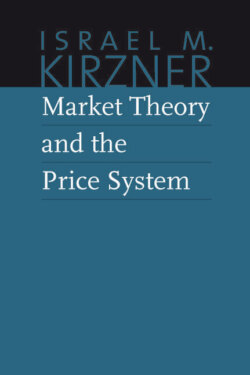Читать книгу Market Theory and the Price System - Israel M. Kirzner - Страница 44
На сайте Литреса книга снята с продажи.
THE MARGINAL UTILITIES OF RELATED GOODS
ОглавлениеIt is useful for many purposes to distinguish between goods that, for a given consumer, are unrelated and goods that are related. Unrelated goods are those whose marginal utility depends only on the quantity of it possessed, not on the quantity possessed of the others. Related goods, on the other hand, are any group of goods whose marginal utility depends, in some way, not only on the quantities of the good itself possessed, but also on the quantities possessed of the other goods in the group.
The relationship between related goods can be one of two kinds. Related goods can be either complementary to one another or substitutes for one another.
Goods that are complementary to one another are those the consumer in some way considers as cooperating together in the satisfaction of a particular want. Automobiles and gasoline, for example, are complementary goods. Pens, paper, and ink are complementary goods. Usually complementary goods may combine in different proportions to satisfy the particular want they are complementary to. Where they are useful only when combined in some fixed proportion, it is useful to consider them as constituting parts of one good. It is hardly more worthwhile to consider separately the items making up a pair of shoes than it would be to consider the utility of water as made up of the utility of hydrogen and oxygen. (Of course, where goods are complementary with respect to one use, but are independently useful elsewhere, it is convenient to keep them distinct.) Complementary goods are distinguished in that for each such good, its marginal utility to the consumer rises, other things being equal, as the quantities possessed of the goods complementary to it increases. The more paper that the owner of a pen acquires, the more significant a bottle of ink may appear to him.
Goods that are substitutes for one another are those the consumer considers capable, to some degree, of satisfying the same particular want. Potatoes and bread, for example, are to a degree capable of satisfying the same wants that are satisfied by the other. Airline transportation and railroad transportation are substitutes, to a degree, each for one another. It is to be noted that when two physically dissimilar commodities are perfect substitutes for one another—where, that is, there is no purpose served by a given quantity of the one that cannot be served equally well by a given quantity of the other—then, from an economic point of view, they are not “different” goods at all. If, for example, there were no purpose for which a blue pencil is used that is not perfectly served by a red pencil, and vice versa, then it would not be expedient to distinguish economically between red and blue pencils at all; they would be used interchangeably. If two nickels could perform all the uses required of a dime, and vice versa, then the two coins would make up an economically homogeneous kind of good. Within this economically homogeneous group there would be, it is true, physical differences—some members of the group being made up of two nickels, the other being each one dime. But this would be as irrelevant as, say, the different registration numbers on two identical automobiles where the difference in number is the only physical means of distinction between them.
Most substitute goods are, however, only imperfect substitutes for one another. A characteristic of goods that a consumer considers as substitutes for one another is that the marginal utility to him of any such good declines, other things being the same, as the quantity possessed of the substitute goods increases. The more rapidly the marginal utility declines in this manner, the more perfect is the substitute relationship between the goods. The special case, as we have seen, of perfect substitutes is one where the marginal utility of the one good declines, with increased possession of the other, exactly as rapidly as it would decline were the quantities possessed of this good itself to be increased in the same proportions.
